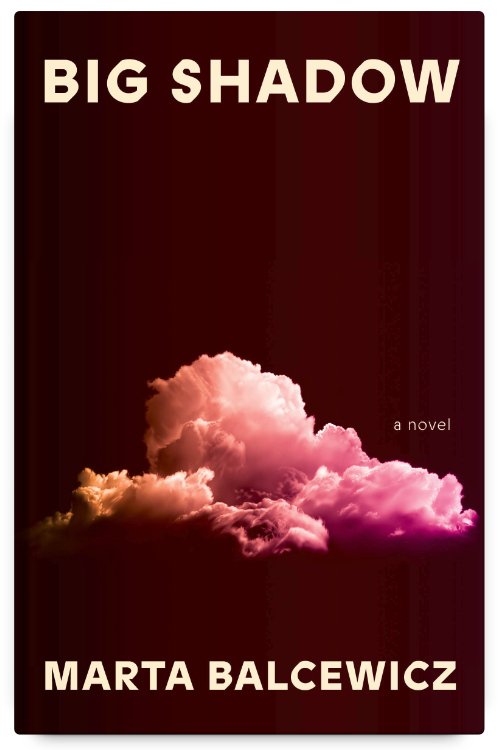'Big Shadow' Shoots Down the Desperate Dreams of Youth
The year is 1998, and Judy is not yet eighteen, just out of high school, and energetically awaiting… something. That something is the vague but ever-present Big Shadow of the novel’s title, a harbinger of great change that she, her cousin, and her best friend (“the only two people I knew,” she remarks with some sadness) spend the early days of summer preparing for.
While we never quite discover what the Big Shadow is, the trio’s cult-like devotion to preparing for it fills the novel’s early chapters with youthful, dreamlike wonder. We do know that the Big Shadow involves clouds. For example: stratocumulous clouds, the kind in the opening credits of The Simpsons, as Balcewicz informs us in the first of many well-placed ‘90s references. We also learn that preparing for the Big Shadow’s arrival involves an old, weed-filled swimming pool—and when Judy’s friends push her into its filthy water, her disillusionment with the Big Shadow, and her existence in her small town, reaches a breaking point.
It’s here that Judy’s focus pivots one hundred eighty degrees to Maurice Blunt, a middle-aged former punk rocker from far-off New York City. He is a being Judy seems to have summoned, for “the act of summoning comes at one’s lowest point, and is subconscious, or at least the most effective type of it is.” No longer satisfied with awaiting the Big Shadow or watching Jeopardy! with her mother, Judy finds herself drawn to Maurice first through a chance meeting, then in his summer class at the university. The class is ostensibly about punk-era poetry but actually involves Maurice reading his own poems and rambling to his hangers-on. These early scenes solidify how Maurice, in all his disorganized mania, wants to see much more of Judy.
Big Shadow’s highest points—the points at which it truly shines as a novel—take place during Judy’s confused yet hopeful pursuit of this man three decades older than her and a magical life in New York City after she abandons her Big Shadow-chasing friend and cousin. However, lest readers suspect where this Insistent Older Guy meets Naïve Younger Girl pairing is headed, Balcewicz never presents Judy as being in real danger with Maurice, even as readers sense her folly. Despite Maurice’s best efforts, Judy’s pursuit of him isn’t romantic, exactly; Judy’s surreptitious weekends in Maurice’s tiny NYC apartment are less about a physical relationship and more about finding an exciting new life. Maurice’s intermittent romantic fumblings seem to surprise Judy, who dismisses them as awkward moments best moved on from, as if Maurice had “failed [a] multiple-choice test. A or B? It was B, not A, turned out.” Each time, clumsy Maurice seems to realize his mistakes and turns tail until his next attempt, where Judy remains equally in control.
Rather than romance, Judy’s pursuit—and this newer, more tangible version of the Big Shadow—involves something more mysterious that she herself doesn’t understand. At one point she finds pride and direction in Maurice’s gushing compliments on what we can imagine to be her mediocre videography with a ‘90s camcorder, and desperately clings to his offhanded insistence that she come on his band’s European reunion tour—an adventure she dreams will provide meaning to her aimless life after high school. Judy’s baseless hope, perhaps, is the true embodiment of the Big Shadow, and Balcewicz’s mastery as a writer lies in her ability to recreate these passionate longings for fulfillment that so many of us harbor in our adolescence. How many of us as young people, despite our lack of resources, talent, and connections, place all of our hopes on an opportunity that seems too good to be true, but that we know will uplift us to the magical, awe-inspiring life we so badly yearn for?
Youthful dreaming aside, readers who’ve aged out of this mindset will have trouble taking Maurice, and Judy’s infatuation with him, seriously, due to the mature perspective of Balcewicz’s narrative. Though she stops just short of direct criticism, through Judy’s eyes Balcewicz tellingly details the aging, overweight Maurice Blunt as, simply put, a hopelessly disorganized doofus whose promises are full of hot air. In one memorable scene, Judy finds Maurice’s memoir on a shelf and reads a passage where one of his romantic conquests compares his manhood to an oversized pine cone, telling him, “You won’t have any trouble satisfying girls in your life, with that,” a truly moronic humble-brag that evokes the most laughable kind of toxic masculinity. “You’re better than this!!!” frustrated readers will no doubt shout into their books as they observe Maurice’s thoughtlessness—though perhaps Judy’s ultimate journey lies in realizing this herself.
That being said, once readers make it through Big Shadow’s oblique opening, they’ll discover a well-crafted coming-of-age story with a dreamlike narration that intensifies their own revelations along with Judy’s as the Big Shadow passes over her life and slips away.
Thank you to Book*hug Press for providing Shrapnel with an advance reading copy. Big Shadow is available now for purchase from Book*hug Press’s website, and in bookstores across Canada.
Ian M. Rogers
writes cool, funny literary fiction and is the author of MFA Thesis Novel, a metafictional comedy about academia. He taught English as a foreign language in Japan for many years, most recently at Kanagawa University in Yokohama. Find more at ianmrogersauthor.com.



